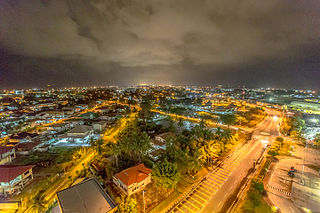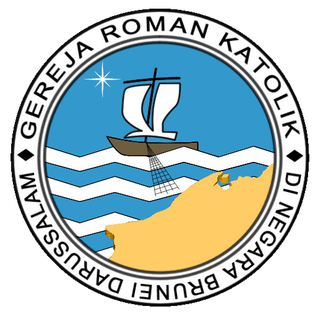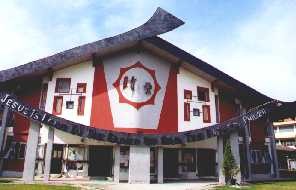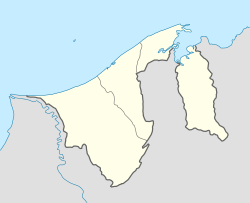
Bandar Seri Begawan (BSB) is the capital and largest city of Brunei. It is officially a municipal area with an area of 100.36 square kilometres (38.75 sq mi) and an estimated population of 100,700 as of 2007. It is part of Brunei–Muara District, the smallest yet most populous district which is home to over 70 per cent of the country's population. It is the country's largest urban centre and nominally the country's only city. The capital is home to Brunei's seat of government, as well as a commercial and cultural centre. It was formerly known as Brunei Town until it was renamed in 1970 in honour of Omar Ali Saifuddien III, the 28th Sultan of Brunei and the father of Sultan Hassanal Bolkiah.

Kuala Belait or officially the Kuala Belait Town, and colloquially referred to as KB, is the administrative town of Belait District, Brunei. The population of the town proper was 4,259 in 2016. Kuala Belait is officially a municipal area, as well as a village under the mukim of the same name. The town is located 85 kilometres (53 mi) west of the country's capital Bandar Seri Begawan, and 20 kilometres (12 mi) west of Seria, the district's other town. It is also in the westernmost part of country, near the mouth of the Belait River.

Seria or officially known as Seria Town, is a town in Belait District, Brunei. It is located about 65 kilometres (40 mi) west from the country's capital Bandar Seri Begawan. The total population was 3,625 in 2016. It was where oil was first struck in Brunei in 1929 and has since become a centre for the country's oil and gas industry.

The Apostolic Vicariate of Brunei Darussalam is a Roman Catholic ecclesiastical jurisdiction covering the territory of Brunei and headed by an apostolic vicar. The first apostolic vicar was Cornelius Sim, who was created a cardinal in 2020 and died in May 2021.

The Catholic Church in Brunei Darussalam is a part of the worldwide Catholic Church, in communion with the pope in Rome, and constitutionally recognised within the state of Brunei Darussalam. The entire territory of the Church in Brunei is organised as an apostolic vicariate, under the leadership of a bishop, since 2005. While no formal diplomatic relations exist between the Holy See and Brunei, there are existing quasi-diplomatic contacts between the church and government agencies at multiple levels. Since 1990, a papal nuncio has visited the country annually to make contact with the local church as well as the foreign affairs ministry. The Apostolic Delegation to Brunei Darussalam was established in 1998 following the establishment of the distinct Bruneian ecclesiastical territory as an apostolic prefecture. The Bruneian ecclesiastical jurisdiction falls under the purview of the Catholic Bishops' Conference of Malaysia, Singapore and Brunei.
The administrative divisions of Brunei Darussalam mainly consist of daerah (districts), mukim (sub-districts), and kampung or kampong (villages). They are organised hierarchically in Brunei Darussalam, with daerah being the largest first level, and kampong the smallest third level.

Kampong Mumong, or simply known as Mumong, is a residential suburb of Kuala Belait, the principal town of Belait District, in Brunei Darussalam. It comprises the original Mumong settlement, as well as the Mumong public housing estate of the Landless Indigenous Citizens' Housing Scheme. However, it officially consists of two village sub-divisions, namely Mumong 'A' and Mumong 'B', which are under the mukim of Kuala Belait.

Rasau is an area in Brunei. The area contains one of the many oil fields of Brunei, the Rasau Field, and a small village, Kampong Rasau, which has a population of 103.

Kampong Sungai Duhon is a village that is located within the town of Kuala Belait in Mukim Kuala Belait, Belait District of Brunei. The postcode is KA3131.
The Diocese of Kuching is a diocese of the Anglican Church of the Province of South East Asia that covers Sarawak and Brunei. Founded in 1962, the see was originally established as the Bishopric of Sarawak linked to the Diocese of Labuan in 1855. The current bishop is the Right Rev'd Danald Jute, 14th Lord Bishop of the Diocese of Kuching and Brunei, who was consecrated on 13 August 2017. His seat is at St. Thomas' Cathedral, Kuching.

The Diocese of Miri is a Latin Church diocese of the Catholic Church in Malaysia. Situated northeast of the Archdiocese of Kuching, of which it is a suffragan diocese. St. Joseph's Cathedral in Miri serves as both the diocesan cathedral and the seat of bishop.

The Roman Catholic Diocese of Sibu is the ecclesiastical territory of the Latin Church or the diocese of the Catholic Church in the state of Sarawak, Malaysia. It is headquartered in Sibu and covered the divisions of Sibu, Mukah, Sarikei, and Kapit.

The Church of Our Lady of Immaculate Conception (COOL) is a Roman Catholic church of the Apostolic Vicariate of Brunei in the town of Seria, Belait District. The late Cardinal Cornelius Sim, the most well-known Catholic in the country, gave it enormous popularity. It is the second of three Roman Catholic churches in the nation; the other two being the St. John's Church in Kuala Belait and the Pro-Cathedral of Our Lady of the Assumption in the Brunei capital Bandar Seri Begawan.

The Catholic Bishops' Conference of Malaysia, Singapore, and Brunei (CBCMSB) is the episcopal conference representing the Catholic Church in the countries of Malaysia, Singapore, and Brunei. The conference serves as a collaborative body of bishops, including diocesan bishops, coadjutors, auxiliary bishops, and diocesan administrators, who collectively oversee and guide the Church's activities in these three countries. The CBCMSB is pivotal in addressing pastoral, liturgical, and social issues relevant to the region's Catholic community.

Transport in Brunei consists of air, land, and sea transport. Previously there was some rail transport in Brunei, but eventually most of it was closed down. Several public and commercial sector organizations are in charge of creating and overseeing these networks and infrastructures. The Ministry of Transport and Infocommunications (MTIC) is in charge of overseeing the maritime and aviation industries, as well as planning and regulating all kinds of land transportation.
Municipalities in Brunei are settlements which have been incorporated by the government to run as municipalities. They are independent from the hierarchy of the country's subdivisions but nevertheless overlap with mukims and villages, the second- and third-level administrative divisions of Brunei. The governing body of a municipality is municipal department which is a government department under the Ministry of Home Affairs; the head is a chairman which is equivalent to mayor.

Kampong Kuala Tutong, also simply known as Kuala Tutong, is a village in Tutong District, Brunei, within the mukim of Pekan Tutong. The postcode for Kampong Kuala Tutong is TA3341. Kampong Kuala Tutong covers 1.3 square kilometres (0.50 sq mi) from the mosque to the river's mouth. Before World War II, a ferry jetty was constructed at the end of Jalan Kuala Tutong, approximately 5 kilometres (3.1 mi) from Kampong Penabai. Since no bridges connected the Tutong and Belait districts at that time, the Brunei government introduced a ferry service in 1930, which operated from Kuala Sungai Tutong. This ferry became a crucial transportation link for vehicles traveling between Brunei Town, Tutong, Seria, and Kuala Belait. However, the service ceased in 1958 following the completion of bridges in Serambangun and Telamba, which made the ferry redundant.
Seri Begawan may refer to:














